Individual Bilingualism Article 2022
VerifiedAdded on 2022/09/23
|12
|3425
|24
AI Summary
Contribute Materials
Your contribution can guide someone’s learning journey. Share your
documents today.
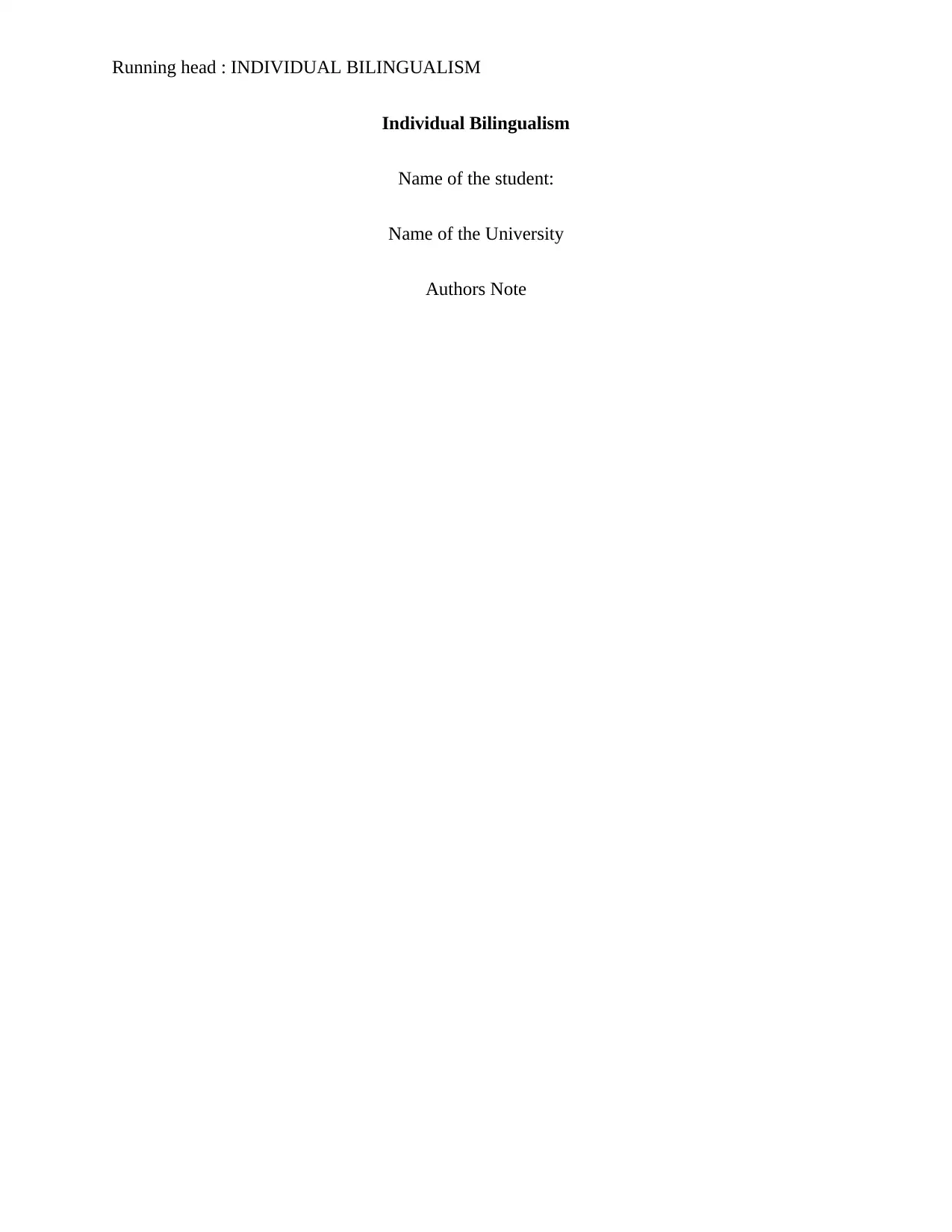
Running head : INDIVIDUAL BILINGUALISM
Individual Bilingualism
Name of the student:
Name of the University
Authors Note
Individual Bilingualism
Name of the student:
Name of the University
Authors Note
Secure Best Marks with AI Grader
Need help grading? Try our AI Grader for instant feedback on your assignments.
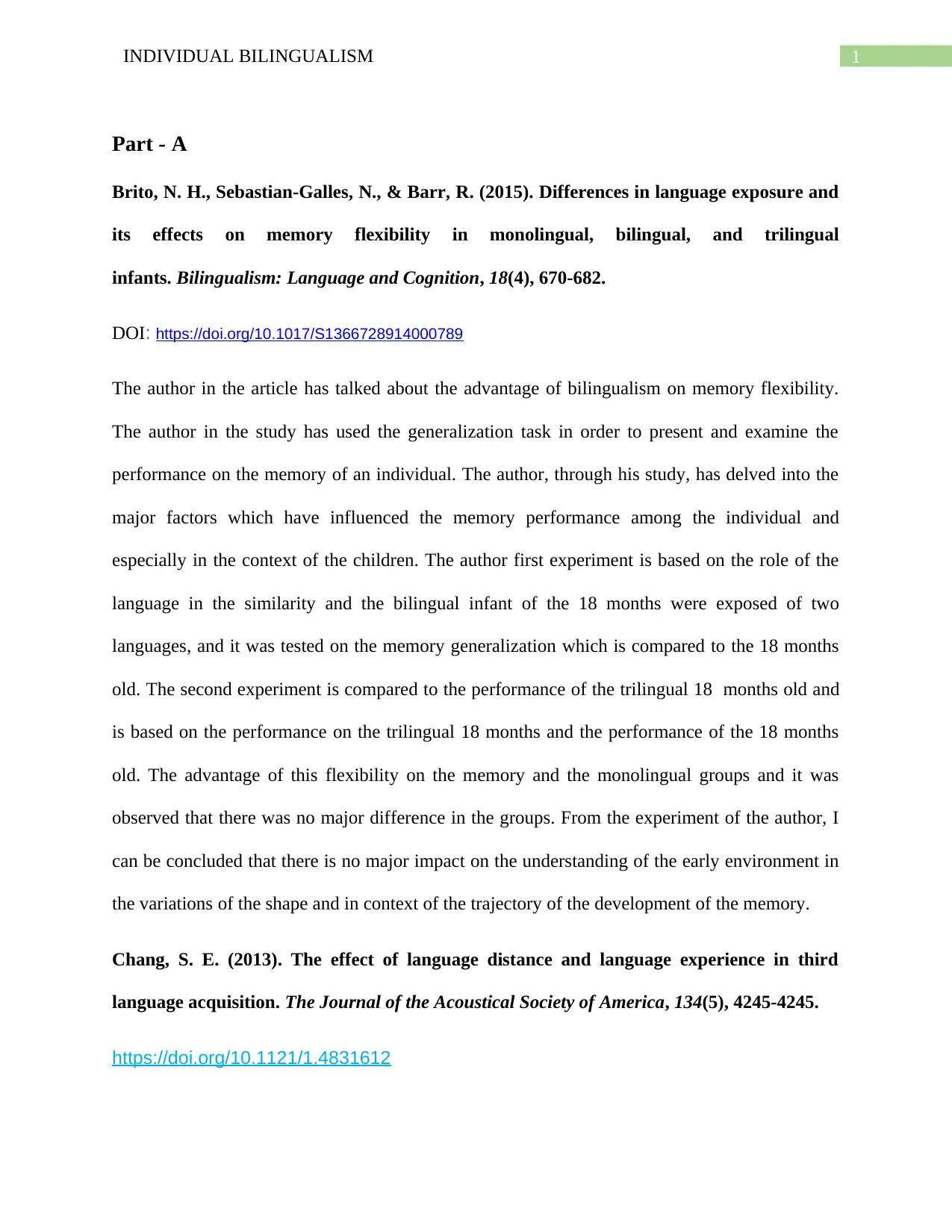
1INDIVIDUAL BILINGUALISM
Part - A
Brito, N. H., Sebastian-Galles, N., & Barr, R. (2015). Differences in language exposure and
its effects on memory flexibility in monolingual, bilingual, and trilingual
infants. Bilingualism: Language and Cognition, 18(4), 670-682.
DOI: https://doi.org/10.1017/S1366728914000789
The author in the article has talked about the advantage of bilingualism on memory flexibility.
The author in the study has used the generalization task in order to present and examine the
performance on the memory of an individual. The author, through his study, has delved into the
major factors which have influenced the memory performance among the individual and
especially in the context of the children. The author first experiment is based on the role of the
language in the similarity and the bilingual infant of the 18 months were exposed of two
languages, and it was tested on the memory generalization which is compared to the 18 months
old. The second experiment is compared to the performance of the trilingual 18 months old and
is based on the performance on the trilingual 18 months and the performance of the 18 months
old. The advantage of this flexibility on the memory and the monolingual groups and it was
observed that there was no major difference in the groups. From the experiment of the author, I
can be concluded that there is no major impact on the understanding of the early environment in
the variations of the shape and in context of the trajectory of the development of the memory.
Chang, S. E. (2013). The effect of language distance and language experience in third
language acquisition. The Journal of the Acoustical Society of America, 134(5), 4245-4245.
https://doi.org/10.1121/1.4831612
Part - A
Brito, N. H., Sebastian-Galles, N., & Barr, R. (2015). Differences in language exposure and
its effects on memory flexibility in monolingual, bilingual, and trilingual
infants. Bilingualism: Language and Cognition, 18(4), 670-682.
DOI: https://doi.org/10.1017/S1366728914000789
The author in the article has talked about the advantage of bilingualism on memory flexibility.
The author in the study has used the generalization task in order to present and examine the
performance on the memory of an individual. The author, through his study, has delved into the
major factors which have influenced the memory performance among the individual and
especially in the context of the children. The author first experiment is based on the role of the
language in the similarity and the bilingual infant of the 18 months were exposed of two
languages, and it was tested on the memory generalization which is compared to the 18 months
old. The second experiment is compared to the performance of the trilingual 18 months old and
is based on the performance on the trilingual 18 months and the performance of the 18 months
old. The advantage of this flexibility on the memory and the monolingual groups and it was
observed that there was no major difference in the groups. From the experiment of the author, I
can be concluded that there is no major impact on the understanding of the early environment in
the variations of the shape and in context of the trajectory of the development of the memory.
Chang, S. E. (2013). The effect of language distance and language experience in third
language acquisition. The Journal of the Acoustical Society of America, 134(5), 4245-4245.
https://doi.org/10.1121/1.4831612
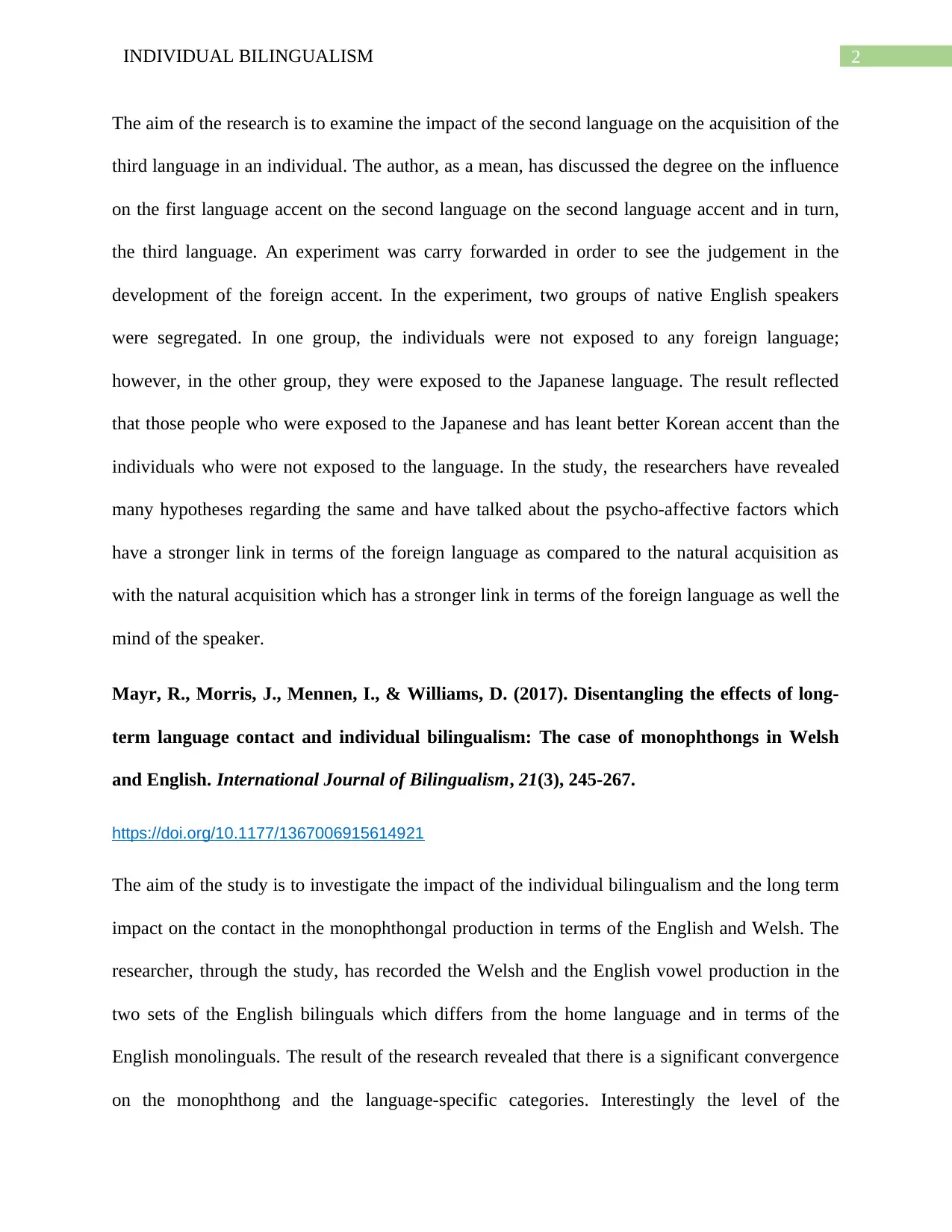
2INDIVIDUAL BILINGUALISM
The aim of the research is to examine the impact of the second language on the acquisition of the
third language in an individual. The author, as a mean, has discussed the degree on the influence
on the first language accent on the second language on the second language accent and in turn,
the third language. An experiment was carry forwarded in order to see the judgement in the
development of the foreign accent. In the experiment, two groups of native English speakers
were segregated. In one group, the individuals were not exposed to any foreign language;
however, in the other group, they were exposed to the Japanese language. The result reflected
that those people who were exposed to the Japanese and has leant better Korean accent than the
individuals who were not exposed to the language. In the study, the researchers have revealed
many hypotheses regarding the same and have talked about the psycho-affective factors which
have a stronger link in terms of the foreign language as compared to the natural acquisition as
with the natural acquisition which has a stronger link in terms of the foreign language as well the
mind of the speaker.
Mayr, R., Morris, J., Mennen, I., & Williams, D. (2017). Disentangling the effects of long-
term language contact and individual bilingualism: The case of monophthongs in Welsh
and English. International Journal of Bilingualism, 21(3), 245-267.
https://doi.org/10.1177/1367006915614921
The aim of the study is to investigate the impact of the individual bilingualism and the long term
impact on the contact in the monophthongal production in terms of the English and Welsh. The
researcher, through the study, has recorded the Welsh and the English vowel production in the
two sets of the English bilinguals which differs from the home language and in terms of the
English monolinguals. The result of the research revealed that there is a significant convergence
on the monophthong and the language-specific categories. Interestingly the level of the
The aim of the research is to examine the impact of the second language on the acquisition of the
third language in an individual. The author, as a mean, has discussed the degree on the influence
on the first language accent on the second language on the second language accent and in turn,
the third language. An experiment was carry forwarded in order to see the judgement in the
development of the foreign accent. In the experiment, two groups of native English speakers
were segregated. In one group, the individuals were not exposed to any foreign language;
however, in the other group, they were exposed to the Japanese language. The result reflected
that those people who were exposed to the Japanese and has leant better Korean accent than the
individuals who were not exposed to the language. In the study, the researchers have revealed
many hypotheses regarding the same and have talked about the psycho-affective factors which
have a stronger link in terms of the foreign language as compared to the natural acquisition as
with the natural acquisition which has a stronger link in terms of the foreign language as well the
mind of the speaker.
Mayr, R., Morris, J., Mennen, I., & Williams, D. (2017). Disentangling the effects of long-
term language contact and individual bilingualism: The case of monophthongs in Welsh
and English. International Journal of Bilingualism, 21(3), 245-267.
https://doi.org/10.1177/1367006915614921
The aim of the study is to investigate the impact of the individual bilingualism and the long term
impact on the contact in the monophthongal production in terms of the English and Welsh. The
researcher, through the study, has recorded the Welsh and the English vowel production in the
two sets of the English bilinguals which differs from the home language and in terms of the
English monolinguals. The result of the research revealed that there is a significant convergence
on the monophthong and the language-specific categories. Interestingly the level of the
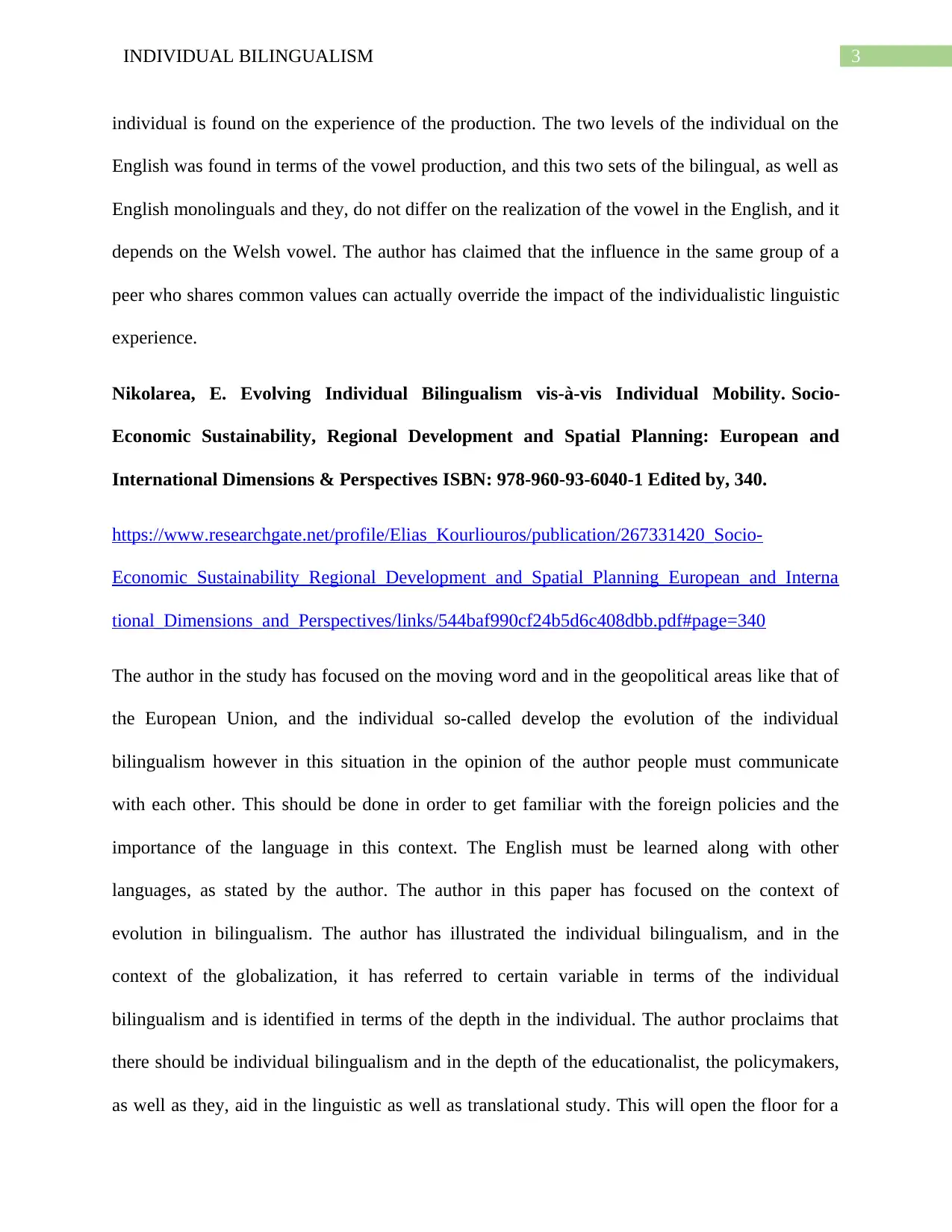
3INDIVIDUAL BILINGUALISM
individual is found on the experience of the production. The two levels of the individual on the
English was found in terms of the vowel production, and this two sets of the bilingual, as well as
English monolinguals and they, do not differ on the realization of the vowel in the English, and it
depends on the Welsh vowel. The author has claimed that the influence in the same group of a
peer who shares common values can actually override the impact of the individualistic linguistic
experience.
Nikolarea, E. Evolving Individual Bilingualism vis-à-vis Individual Mobility. Socio-
Economic Sustainability, Regional Development and Spatial Planning: European and
International Dimensions & Perspectives ISBN: 978-960-93-6040-1 Edited by, 340.
https://www.researchgate.net/profile/Elias_Kourliouros/publication/267331420_Socio-
Economic_Sustainability_Regional_Development_and_Spatial_Planning_European_and_Interna
tional_Dimensions_and_Perspectives/links/544baf990cf24b5d6c408dbb.pdf#page=340
The author in the study has focused on the moving word and in the geopolitical areas like that of
the European Union, and the individual so-called develop the evolution of the individual
bilingualism however in this situation in the opinion of the author people must communicate
with each other. This should be done in order to get familiar with the foreign policies and the
importance of the language in this context. The English must be learned along with other
languages, as stated by the author. The author in this paper has focused on the context of
evolution in bilingualism. The author has illustrated the individual bilingualism, and in the
context of the globalization, it has referred to certain variable in terms of the individual
bilingualism and is identified in terms of the depth in the individual. The author proclaims that
there should be individual bilingualism and in the depth of the educationalist, the policymakers,
as well as they, aid in the linguistic as well as translational study. This will open the floor for a
individual is found on the experience of the production. The two levels of the individual on the
English was found in terms of the vowel production, and this two sets of the bilingual, as well as
English monolinguals and they, do not differ on the realization of the vowel in the English, and it
depends on the Welsh vowel. The author has claimed that the influence in the same group of a
peer who shares common values can actually override the impact of the individualistic linguistic
experience.
Nikolarea, E. Evolving Individual Bilingualism vis-à-vis Individual Mobility. Socio-
Economic Sustainability, Regional Development and Spatial Planning: European and
International Dimensions & Perspectives ISBN: 978-960-93-6040-1 Edited by, 340.
https://www.researchgate.net/profile/Elias_Kourliouros/publication/267331420_Socio-
Economic_Sustainability_Regional_Development_and_Spatial_Planning_European_and_Interna
tional_Dimensions_and_Perspectives/links/544baf990cf24b5d6c408dbb.pdf#page=340
The author in the study has focused on the moving word and in the geopolitical areas like that of
the European Union, and the individual so-called develop the evolution of the individual
bilingualism however in this situation in the opinion of the author people must communicate
with each other. This should be done in order to get familiar with the foreign policies and the
importance of the language in this context. The English must be learned along with other
languages, as stated by the author. The author in this paper has focused on the context of
evolution in bilingualism. The author has illustrated the individual bilingualism, and in the
context of the globalization, it has referred to certain variable in terms of the individual
bilingualism and is identified in terms of the depth in the individual. The author proclaims that
there should be individual bilingualism and in the depth of the educationalist, the policymakers,
as well as they, aid in the linguistic as well as translational study. This will open the floor for a
Secure Best Marks with AI Grader
Need help grading? Try our AI Grader for instant feedback on your assignments.
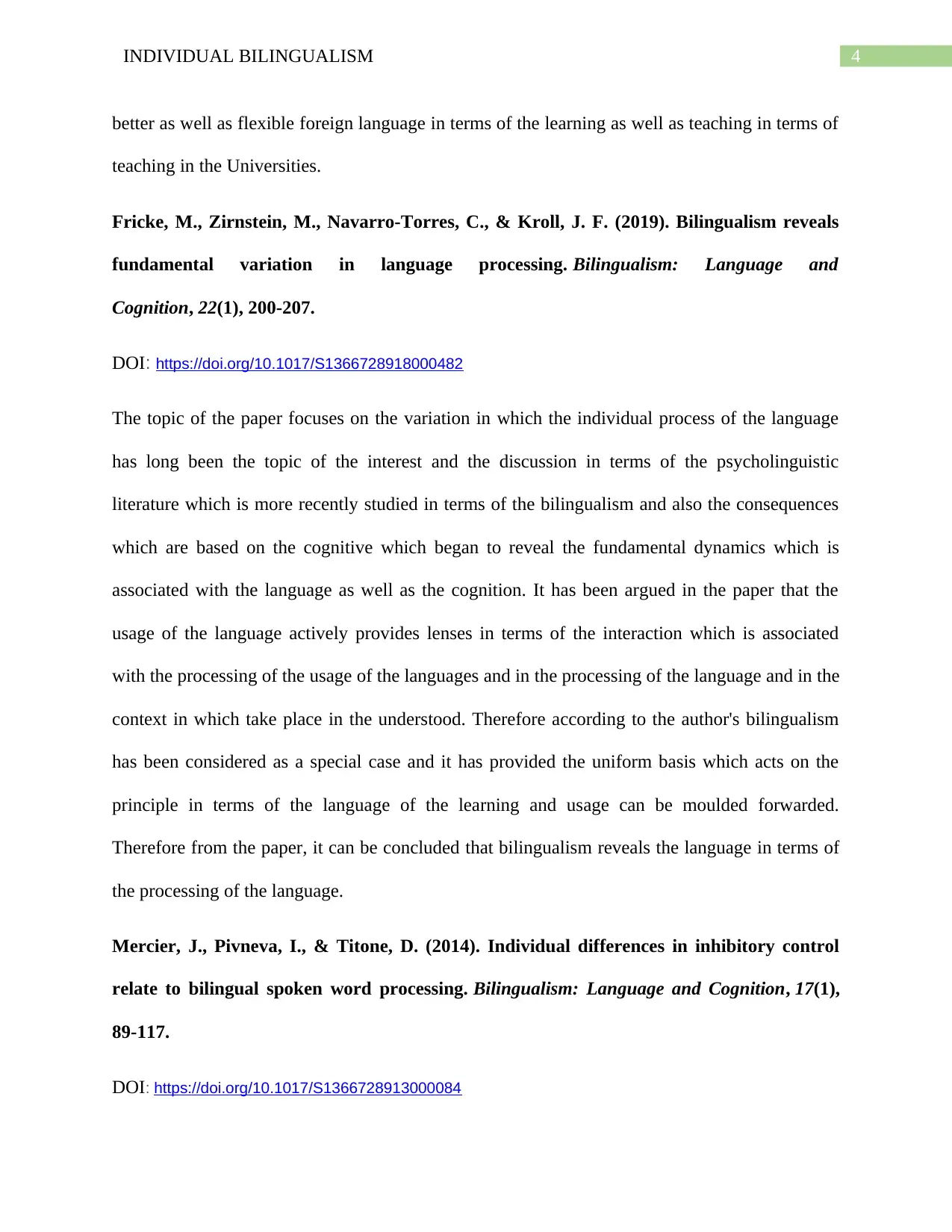
4INDIVIDUAL BILINGUALISM
better as well as flexible foreign language in terms of the learning as well as teaching in terms of
teaching in the Universities.
Fricke, M., Zirnstein, M., Navarro-Torres, C., & Kroll, J. F. (2019). Bilingualism reveals
fundamental variation in language processing. Bilingualism: Language and
Cognition, 22(1), 200-207.
DOI: https://doi.org/10.1017/S1366728918000482
The topic of the paper focuses on the variation in which the individual process of the language
has long been the topic of the interest and the discussion in terms of the psycholinguistic
literature which is more recently studied in terms of the bilingualism and also the consequences
which are based on the cognitive which began to reveal the fundamental dynamics which is
associated with the language as well as the cognition. It has been argued in the paper that the
usage of the language actively provides lenses in terms of the interaction which is associated
with the processing of the usage of the languages and in the processing of the language and in the
context in which take place in the understood. Therefore according to the author's bilingualism
has been considered as a special case and it has provided the uniform basis which acts on the
principle in terms of the language of the learning and usage can be moulded forwarded.
Therefore from the paper, it can be concluded that bilingualism reveals the language in terms of
the processing of the language.
Mercier, J., Pivneva, I., & Titone, D. (2014). Individual differences in inhibitory control
relate to bilingual spoken word processing. Bilingualism: Language and Cognition, 17(1),
89-117.
DOI: https://doi.org/10.1017/S1366728913000084
better as well as flexible foreign language in terms of the learning as well as teaching in terms of
teaching in the Universities.
Fricke, M., Zirnstein, M., Navarro-Torres, C., & Kroll, J. F. (2019). Bilingualism reveals
fundamental variation in language processing. Bilingualism: Language and
Cognition, 22(1), 200-207.
DOI: https://doi.org/10.1017/S1366728918000482
The topic of the paper focuses on the variation in which the individual process of the language
has long been the topic of the interest and the discussion in terms of the psycholinguistic
literature which is more recently studied in terms of the bilingualism and also the consequences
which are based on the cognitive which began to reveal the fundamental dynamics which is
associated with the language as well as the cognition. It has been argued in the paper that the
usage of the language actively provides lenses in terms of the interaction which is associated
with the processing of the usage of the languages and in the processing of the language and in the
context in which take place in the understood. Therefore according to the author's bilingualism
has been considered as a special case and it has provided the uniform basis which acts on the
principle in terms of the language of the learning and usage can be moulded forwarded.
Therefore from the paper, it can be concluded that bilingualism reveals the language in terms of
the processing of the language.
Mercier, J., Pivneva, I., & Titone, D. (2014). Individual differences in inhibitory control
relate to bilingual spoken word processing. Bilingualism: Language and Cognition, 17(1),
89-117.
DOI: https://doi.org/10.1017/S1366728913000084
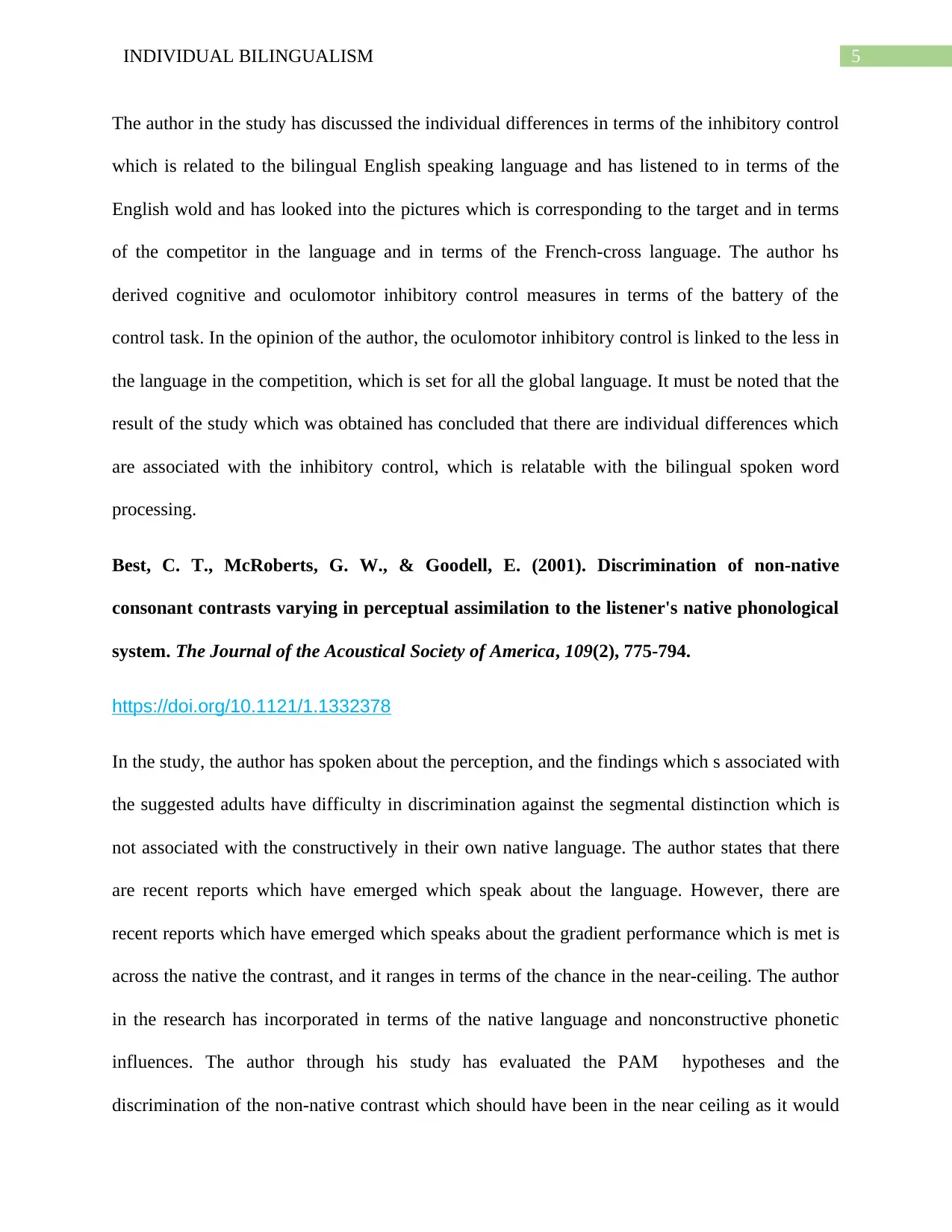
5INDIVIDUAL BILINGUALISM
The author in the study has discussed the individual differences in terms of the inhibitory control
which is related to the bilingual English speaking language and has listened to in terms of the
English wold and has looked into the pictures which is corresponding to the target and in terms
of the competitor in the language and in terms of the French-cross language. The author hs
derived cognitive and oculomotor inhibitory control measures in terms of the battery of the
control task. In the opinion of the author, the oculomotor inhibitory control is linked to the less in
the language in the competition, which is set for all the global language. It must be noted that the
result of the study which was obtained has concluded that there are individual differences which
are associated with the inhibitory control, which is relatable with the bilingual spoken word
processing.
Best, C. T., McRoberts, G. W., & Goodell, E. (2001). Discrimination of non-native
consonant contrasts varying in perceptual assimilation to the listener's native phonological
system. The Journal of the Acoustical Society of America, 109(2), 775-794.
https://doi.org/10.1121/1.1332378
In the study, the author has spoken about the perception, and the findings which s associated with
the suggested adults have difficulty in discrimination against the segmental distinction which is
not associated with the constructively in their own native language. The author states that there
are recent reports which have emerged which speak about the language. However, there are
recent reports which have emerged which speaks about the gradient performance which is met is
across the native the contrast, and it ranges in terms of the chance in the near-ceiling. The author
in the research has incorporated in terms of the native language and nonconstructive phonetic
influences. The author through his study has evaluated the PAM hypotheses and the
discrimination of the non-native contrast which should have been in the near ceiling as it would
The author in the study has discussed the individual differences in terms of the inhibitory control
which is related to the bilingual English speaking language and has listened to in terms of the
English wold and has looked into the pictures which is corresponding to the target and in terms
of the competitor in the language and in terms of the French-cross language. The author hs
derived cognitive and oculomotor inhibitory control measures in terms of the battery of the
control task. In the opinion of the author, the oculomotor inhibitory control is linked to the less in
the language in the competition, which is set for all the global language. It must be noted that the
result of the study which was obtained has concluded that there are individual differences which
are associated with the inhibitory control, which is relatable with the bilingual spoken word
processing.
Best, C. T., McRoberts, G. W., & Goodell, E. (2001). Discrimination of non-native
consonant contrasts varying in perceptual assimilation to the listener's native phonological
system. The Journal of the Acoustical Society of America, 109(2), 775-794.
https://doi.org/10.1121/1.1332378
In the study, the author has spoken about the perception, and the findings which s associated with
the suggested adults have difficulty in discrimination against the segmental distinction which is
not associated with the constructively in their own native language. The author states that there
are recent reports which have emerged which speak about the language. However, there are
recent reports which have emerged which speaks about the gradient performance which is met is
across the native the contrast, and it ranges in terms of the chance in the near-ceiling. The author
in the research has incorporated in terms of the native language and nonconstructive phonetic
influences. The author through his study has evaluated the PAM hypotheses and the
discrimination of the non-native contrast which should have been in the near ceiling as it would
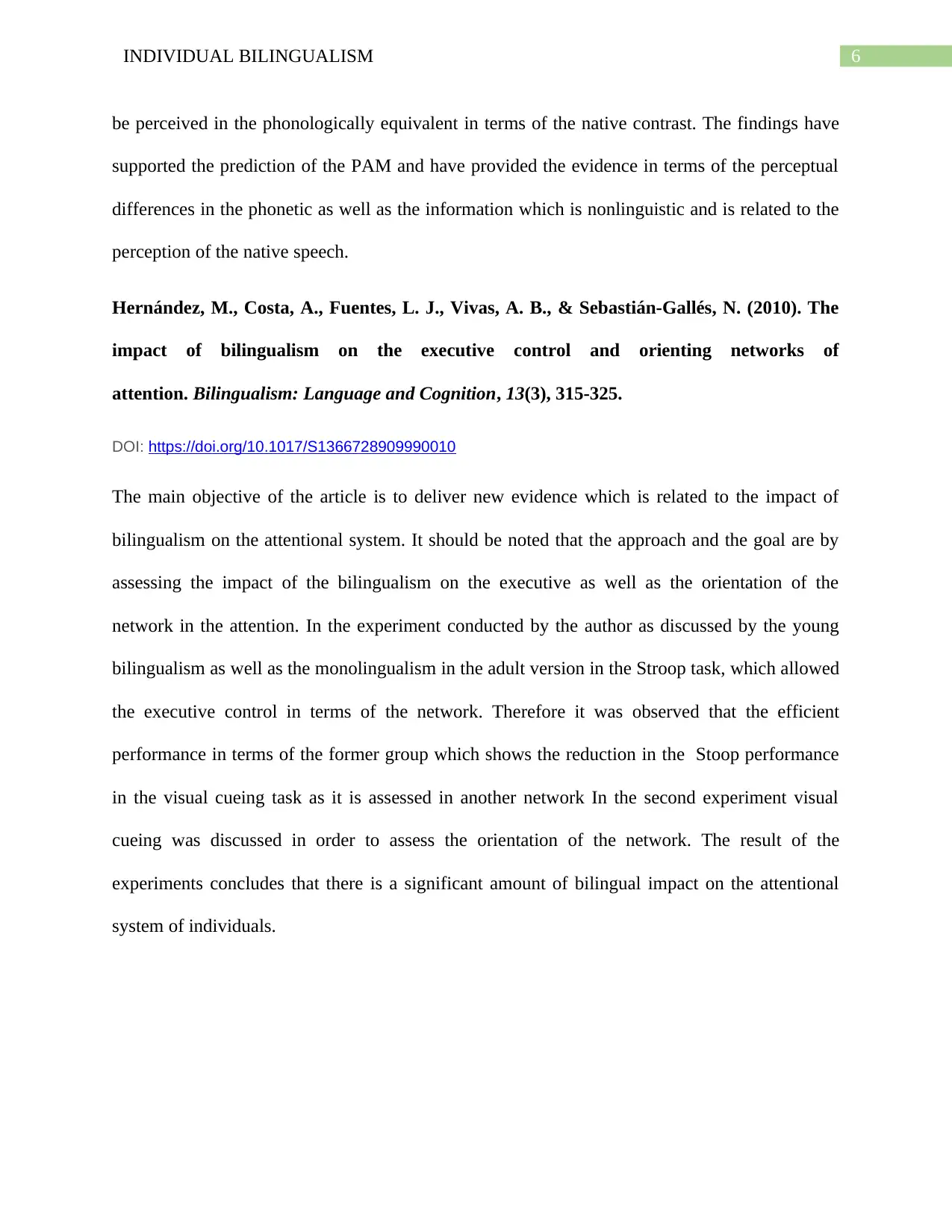
6INDIVIDUAL BILINGUALISM
be perceived in the phonologically equivalent in terms of the native contrast. The findings have
supported the prediction of the PAM and have provided the evidence in terms of the perceptual
differences in the phonetic as well as the information which is nonlinguistic and is related to the
perception of the native speech.
Hernández, M., Costa, A., Fuentes, L. J., Vivas, A. B., & Sebastián-Gallés, N. (2010). The
impact of bilingualism on the executive control and orienting networks of
attention. Bilingualism: Language and Cognition, 13(3), 315-325.
DOI: https://doi.org/10.1017/S1366728909990010
The main objective of the article is to deliver new evidence which is related to the impact of
bilingualism on the attentional system. It should be noted that the approach and the goal are by
assessing the impact of the bilingualism on the executive as well as the orientation of the
network in the attention. In the experiment conducted by the author as discussed by the young
bilingualism as well as the monolingualism in the adult version in the Stroop task, which allowed
the executive control in terms of the network. Therefore it was observed that the efficient
performance in terms of the former group which shows the reduction in the Stoop performance
in the visual cueing task as it is assessed in another network In the second experiment visual
cueing was discussed in order to assess the orientation of the network. The result of the
experiments concludes that there is a significant amount of bilingual impact on the attentional
system of individuals.
be perceived in the phonologically equivalent in terms of the native contrast. The findings have
supported the prediction of the PAM and have provided the evidence in terms of the perceptual
differences in the phonetic as well as the information which is nonlinguistic and is related to the
perception of the native speech.
Hernández, M., Costa, A., Fuentes, L. J., Vivas, A. B., & Sebastián-Gallés, N. (2010). The
impact of bilingualism on the executive control and orienting networks of
attention. Bilingualism: Language and Cognition, 13(3), 315-325.
DOI: https://doi.org/10.1017/S1366728909990010
The main objective of the article is to deliver new evidence which is related to the impact of
bilingualism on the attentional system. It should be noted that the approach and the goal are by
assessing the impact of the bilingualism on the executive as well as the orientation of the
network in the attention. In the experiment conducted by the author as discussed by the young
bilingualism as well as the monolingualism in the adult version in the Stroop task, which allowed
the executive control in terms of the network. Therefore it was observed that the efficient
performance in terms of the former group which shows the reduction in the Stoop performance
in the visual cueing task as it is assessed in another network In the second experiment visual
cueing was discussed in order to assess the orientation of the network. The result of the
experiments concludes that there is a significant amount of bilingual impact on the attentional
system of individuals.
Paraphrase This Document
Need a fresh take? Get an instant paraphrase of this document with our AI Paraphraser
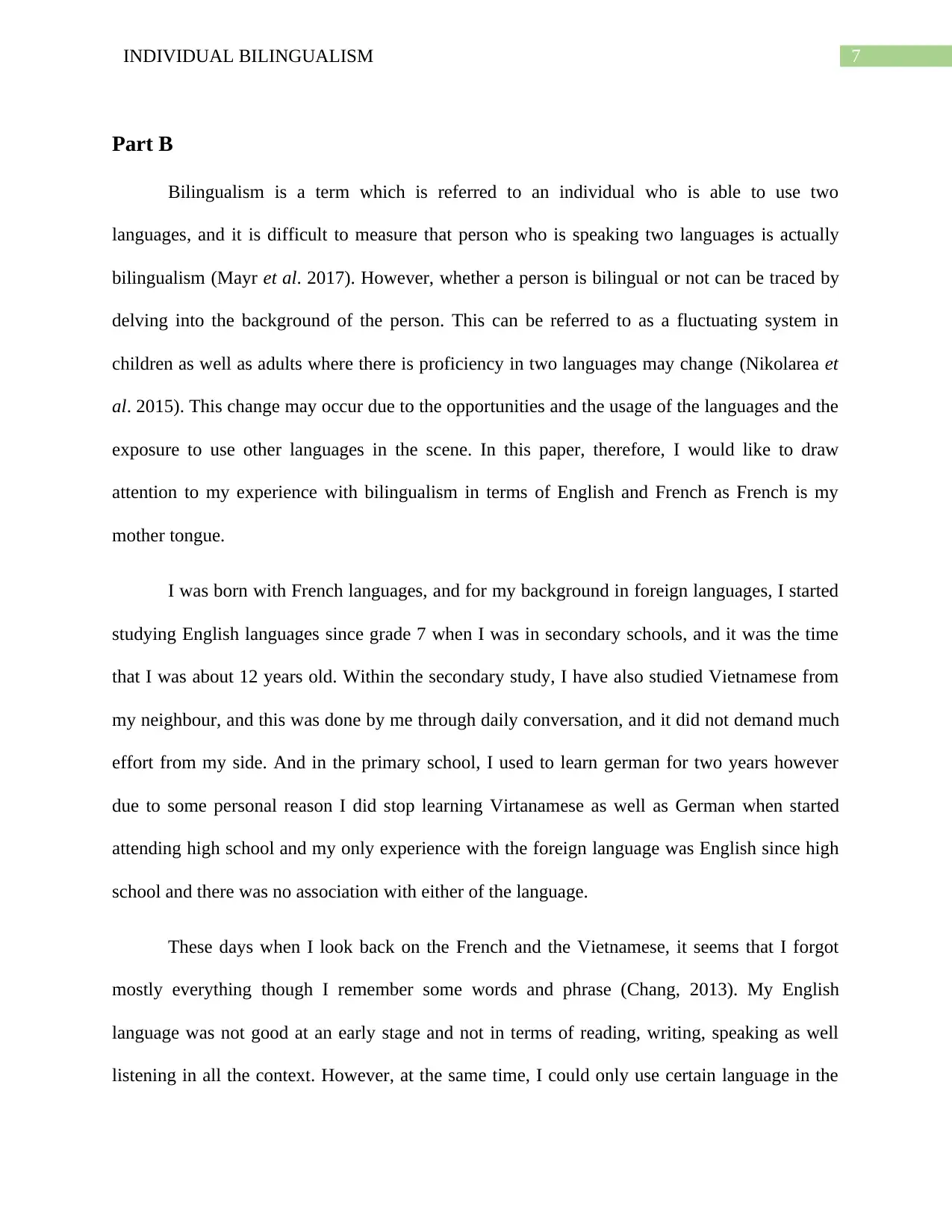
7INDIVIDUAL BILINGUALISM
Part B
Bilingualism is a term which is referred to an individual who is able to use two
languages, and it is difficult to measure that person who is speaking two languages is actually
bilingualism (Mayr et al. 2017). However, whether a person is bilingual or not can be traced by
delving into the background of the person. This can be referred to as a fluctuating system in
children as well as adults where there is proficiency in two languages may change (Nikolarea et
al. 2015). This change may occur due to the opportunities and the usage of the languages and the
exposure to use other languages in the scene. In this paper, therefore, I would like to draw
attention to my experience with bilingualism in terms of English and French as French is my
mother tongue.
I was born with French languages, and for my background in foreign languages, I started
studying English languages since grade 7 when I was in secondary schools, and it was the time
that I was about 12 years old. Within the secondary study, I have also studied Vietnamese from
my neighbour, and this was done by me through daily conversation, and it did not demand much
effort from my side. And in the primary school, I used to learn german for two years however
due to some personal reason I did stop learning Virtanamese as well as German when started
attending high school and my only experience with the foreign language was English since high
school and there was no association with either of the language.
These days when I look back on the French and the Vietnamese, it seems that I forgot
mostly everything though I remember some words and phrase (Chang, 2013). My English
language was not good at an early stage and not in terms of reading, writing, speaking as well
listening in all the context. However, at the same time, I could only use certain language in the
Part B
Bilingualism is a term which is referred to an individual who is able to use two
languages, and it is difficult to measure that person who is speaking two languages is actually
bilingualism (Mayr et al. 2017). However, whether a person is bilingual or not can be traced by
delving into the background of the person. This can be referred to as a fluctuating system in
children as well as adults where there is proficiency in two languages may change (Nikolarea et
al. 2015). This change may occur due to the opportunities and the usage of the languages and the
exposure to use other languages in the scene. In this paper, therefore, I would like to draw
attention to my experience with bilingualism in terms of English and French as French is my
mother tongue.
I was born with French languages, and for my background in foreign languages, I started
studying English languages since grade 7 when I was in secondary schools, and it was the time
that I was about 12 years old. Within the secondary study, I have also studied Vietnamese from
my neighbour, and this was done by me through daily conversation, and it did not demand much
effort from my side. And in the primary school, I used to learn german for two years however
due to some personal reason I did stop learning Virtanamese as well as German when started
attending high school and my only experience with the foreign language was English since high
school and there was no association with either of the language.
These days when I look back on the French and the Vietnamese, it seems that I forgot
mostly everything though I remember some words and phrase (Chang, 2013). My English
language was not good at an early stage and not in terms of reading, writing, speaking as well
listening in all the context. However, at the same time, I could only use certain language in the
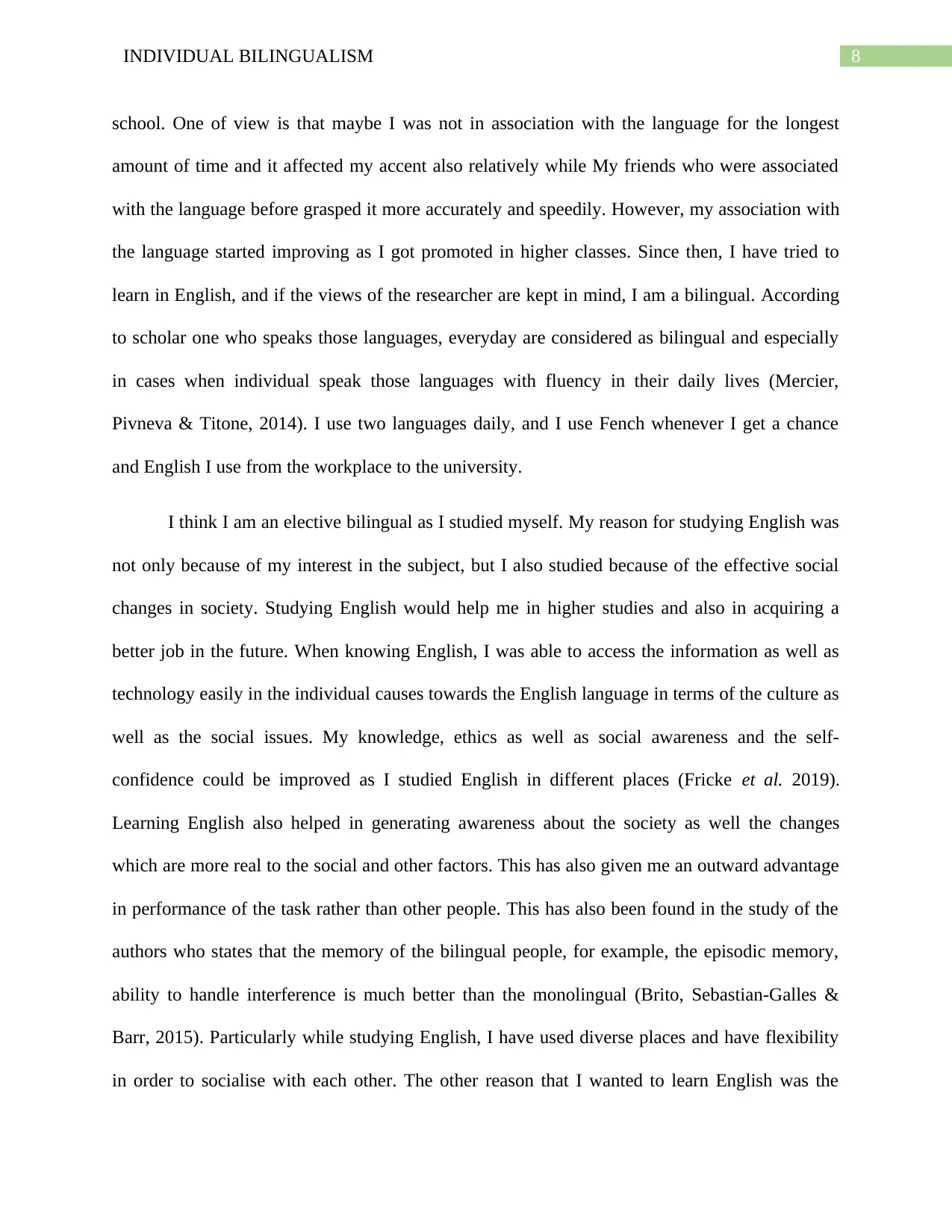
8INDIVIDUAL BILINGUALISM
school. One of view is that maybe I was not in association with the language for the longest
amount of time and it affected my accent also relatively while My friends who were associated
with the language before grasped it more accurately and speedily. However, my association with
the language started improving as I got promoted in higher classes. Since then, I have tried to
learn in English, and if the views of the researcher are kept in mind, I am a bilingual. According
to scholar one who speaks those languages, everyday are considered as bilingual and especially
in cases when individual speak those languages with fluency in their daily lives (Mercier,
Pivneva & Titone, 2014). I use two languages daily, and I use Fench whenever I get a chance
and English I use from the workplace to the university.
I think I am an elective bilingual as I studied myself. My reason for studying English was
not only because of my interest in the subject, but I also studied because of the effective social
changes in society. Studying English would help me in higher studies and also in acquiring a
better job in the future. When knowing English, I was able to access the information as well as
technology easily in the individual causes towards the English language in terms of the culture as
well as the social issues. My knowledge, ethics as well as social awareness and the self-
confidence could be improved as I studied English in different places (Fricke et al. 2019).
Learning English also helped in generating awareness about the society as well the changes
which are more real to the social and other factors. This has also given me an outward advantage
in performance of the task rather than other people. This has also been found in the study of the
authors who states that the memory of the bilingual people, for example, the episodic memory,
ability to handle interference is much better than the monolingual (Brito, Sebastian-Galles &
Barr, 2015). Particularly while studying English, I have used diverse places and have flexibility
in order to socialise with each other. The other reason that I wanted to learn English was the
school. One of view is that maybe I was not in association with the language for the longest
amount of time and it affected my accent also relatively while My friends who were associated
with the language before grasped it more accurately and speedily. However, my association with
the language started improving as I got promoted in higher classes. Since then, I have tried to
learn in English, and if the views of the researcher are kept in mind, I am a bilingual. According
to scholar one who speaks those languages, everyday are considered as bilingual and especially
in cases when individual speak those languages with fluency in their daily lives (Mercier,
Pivneva & Titone, 2014). I use two languages daily, and I use Fench whenever I get a chance
and English I use from the workplace to the university.
I think I am an elective bilingual as I studied myself. My reason for studying English was
not only because of my interest in the subject, but I also studied because of the effective social
changes in society. Studying English would help me in higher studies and also in acquiring a
better job in the future. When knowing English, I was able to access the information as well as
technology easily in the individual causes towards the English language in terms of the culture as
well as the social issues. My knowledge, ethics as well as social awareness and the self-
confidence could be improved as I studied English in different places (Fricke et al. 2019).
Learning English also helped in generating awareness about the society as well the changes
which are more real to the social and other factors. This has also given me an outward advantage
in performance of the task rather than other people. This has also been found in the study of the
authors who states that the memory of the bilingual people, for example, the episodic memory,
ability to handle interference is much better than the monolingual (Brito, Sebastian-Galles &
Barr, 2015). Particularly while studying English, I have used diverse places and have flexibility
in order to socialise with each other. The other reason that I wanted to learn English was the
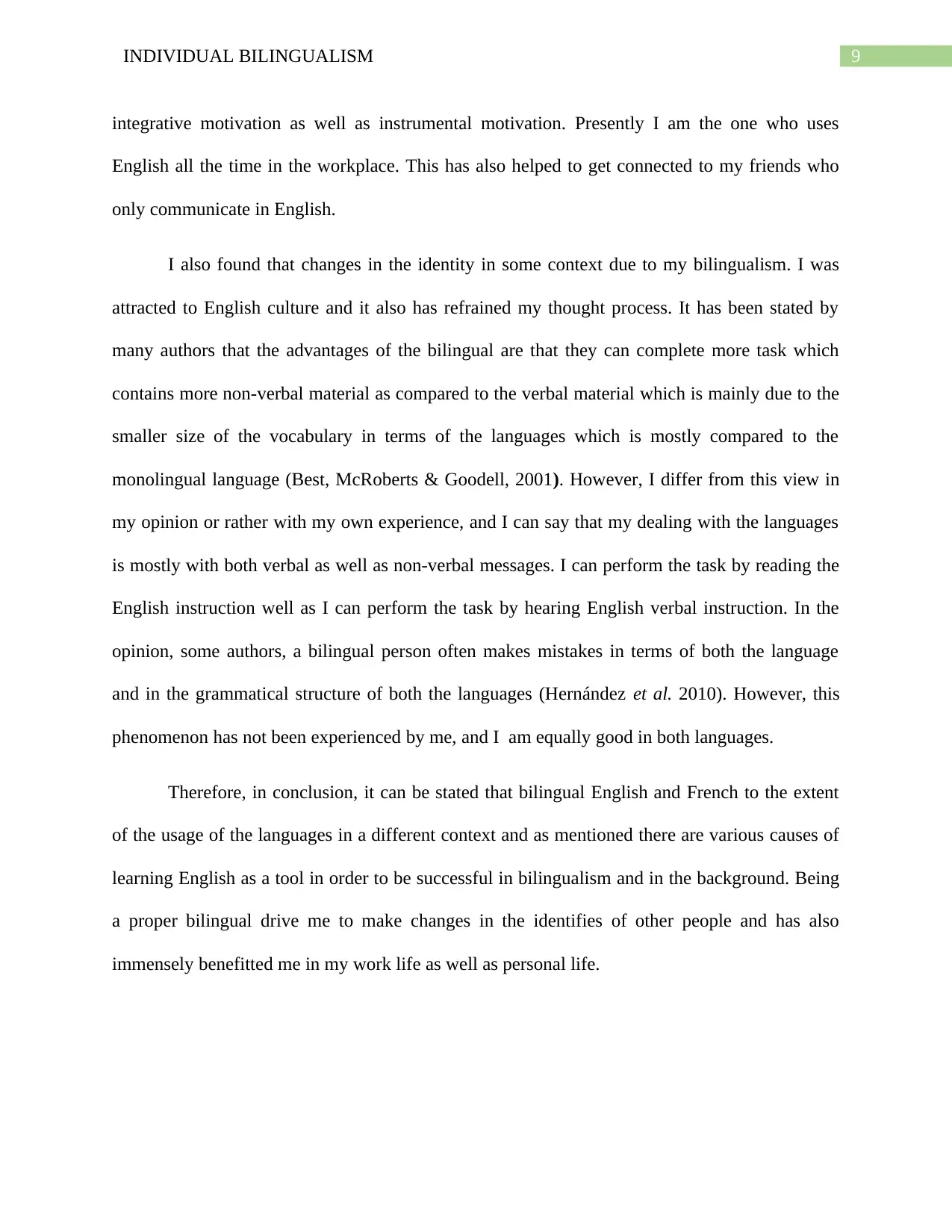
9INDIVIDUAL BILINGUALISM
integrative motivation as well as instrumental motivation. Presently I am the one who uses
English all the time in the workplace. This has also helped to get connected to my friends who
only communicate in English.
I also found that changes in the identity in some context due to my bilingualism. I was
attracted to English culture and it also has refrained my thought process. It has been stated by
many authors that the advantages of the bilingual are that they can complete more task which
contains more non-verbal material as compared to the verbal material which is mainly due to the
smaller size of the vocabulary in terms of the languages which is mostly compared to the
monolingual language (Best, McRoberts & Goodell, 2001). However, I differ from this view in
my opinion or rather with my own experience, and I can say that my dealing with the languages
is mostly with both verbal as well as non-verbal messages. I can perform the task by reading the
English instruction well as I can perform the task by hearing English verbal instruction. In the
opinion, some authors, a bilingual person often makes mistakes in terms of both the language
and in the grammatical structure of both the languages (Hernández et al. 2010). However, this
phenomenon has not been experienced by me, and I am equally good in both languages.
Therefore, in conclusion, it can be stated that bilingual English and French to the extent
of the usage of the languages in a different context and as mentioned there are various causes of
learning English as a tool in order to be successful in bilingualism and in the background. Being
a proper bilingual drive me to make changes in the identifies of other people and has also
immensely benefitted me in my work life as well as personal life.
integrative motivation as well as instrumental motivation. Presently I am the one who uses
English all the time in the workplace. This has also helped to get connected to my friends who
only communicate in English.
I also found that changes in the identity in some context due to my bilingualism. I was
attracted to English culture and it also has refrained my thought process. It has been stated by
many authors that the advantages of the bilingual are that they can complete more task which
contains more non-verbal material as compared to the verbal material which is mainly due to the
smaller size of the vocabulary in terms of the languages which is mostly compared to the
monolingual language (Best, McRoberts & Goodell, 2001). However, I differ from this view in
my opinion or rather with my own experience, and I can say that my dealing with the languages
is mostly with both verbal as well as non-verbal messages. I can perform the task by reading the
English instruction well as I can perform the task by hearing English verbal instruction. In the
opinion, some authors, a bilingual person often makes mistakes in terms of both the language
and in the grammatical structure of both the languages (Hernández et al. 2010). However, this
phenomenon has not been experienced by me, and I am equally good in both languages.
Therefore, in conclusion, it can be stated that bilingual English and French to the extent
of the usage of the languages in a different context and as mentioned there are various causes of
learning English as a tool in order to be successful in bilingualism and in the background. Being
a proper bilingual drive me to make changes in the identifies of other people and has also
immensely benefitted me in my work life as well as personal life.
Secure Best Marks with AI Grader
Need help grading? Try our AI Grader for instant feedback on your assignments.
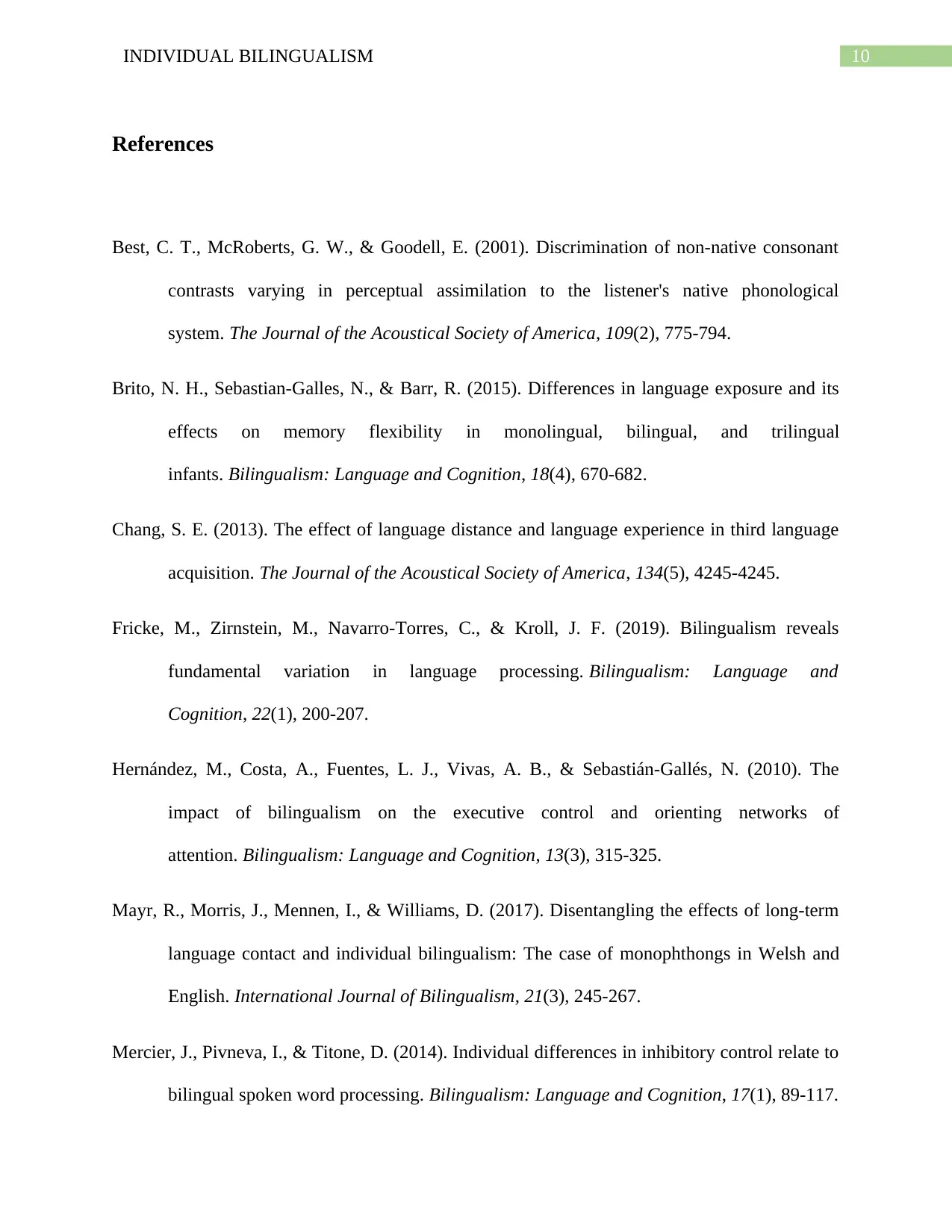
10INDIVIDUAL BILINGUALISM
References
Best, C. T., McRoberts, G. W., & Goodell, E. (2001). Discrimination of non-native consonant
contrasts varying in perceptual assimilation to the listener's native phonological
system. The Journal of the Acoustical Society of America, 109(2), 775-794.
Brito, N. H., Sebastian-Galles, N., & Barr, R. (2015). Differences in language exposure and its
effects on memory flexibility in monolingual, bilingual, and trilingual
infants. Bilingualism: Language and Cognition, 18(4), 670-682.
Chang, S. E. (2013). The effect of language distance and language experience in third language
acquisition. The Journal of the Acoustical Society of America, 134(5), 4245-4245.
Fricke, M., Zirnstein, M., Navarro-Torres, C., & Kroll, J. F. (2019). Bilingualism reveals
fundamental variation in language processing. Bilingualism: Language and
Cognition, 22(1), 200-207.
Hernández, M., Costa, A., Fuentes, L. J., Vivas, A. B., & Sebastián-Gallés, N. (2010). The
impact of bilingualism on the executive control and orienting networks of
attention. Bilingualism: Language and Cognition, 13(3), 315-325.
Mayr, R., Morris, J., Mennen, I., & Williams, D. (2017). Disentangling the effects of long-term
language contact and individual bilingualism: The case of monophthongs in Welsh and
English. International Journal of Bilingualism, 21(3), 245-267.
Mercier, J., Pivneva, I., & Titone, D. (2014). Individual differences in inhibitory control relate to
bilingual spoken word processing. Bilingualism: Language and Cognition, 17(1), 89-117.
References
Best, C. T., McRoberts, G. W., & Goodell, E. (2001). Discrimination of non-native consonant
contrasts varying in perceptual assimilation to the listener's native phonological
system. The Journal of the Acoustical Society of America, 109(2), 775-794.
Brito, N. H., Sebastian-Galles, N., & Barr, R. (2015). Differences in language exposure and its
effects on memory flexibility in monolingual, bilingual, and trilingual
infants. Bilingualism: Language and Cognition, 18(4), 670-682.
Chang, S. E. (2013). The effect of language distance and language experience in third language
acquisition. The Journal of the Acoustical Society of America, 134(5), 4245-4245.
Fricke, M., Zirnstein, M., Navarro-Torres, C., & Kroll, J. F. (2019). Bilingualism reveals
fundamental variation in language processing. Bilingualism: Language and
Cognition, 22(1), 200-207.
Hernández, M., Costa, A., Fuentes, L. J., Vivas, A. B., & Sebastián-Gallés, N. (2010). The
impact of bilingualism on the executive control and orienting networks of
attention. Bilingualism: Language and Cognition, 13(3), 315-325.
Mayr, R., Morris, J., Mennen, I., & Williams, D. (2017). Disentangling the effects of long-term
language contact and individual bilingualism: The case of monophthongs in Welsh and
English. International Journal of Bilingualism, 21(3), 245-267.
Mercier, J., Pivneva, I., & Titone, D. (2014). Individual differences in inhibitory control relate to
bilingual spoken word processing. Bilingualism: Language and Cognition, 17(1), 89-117.
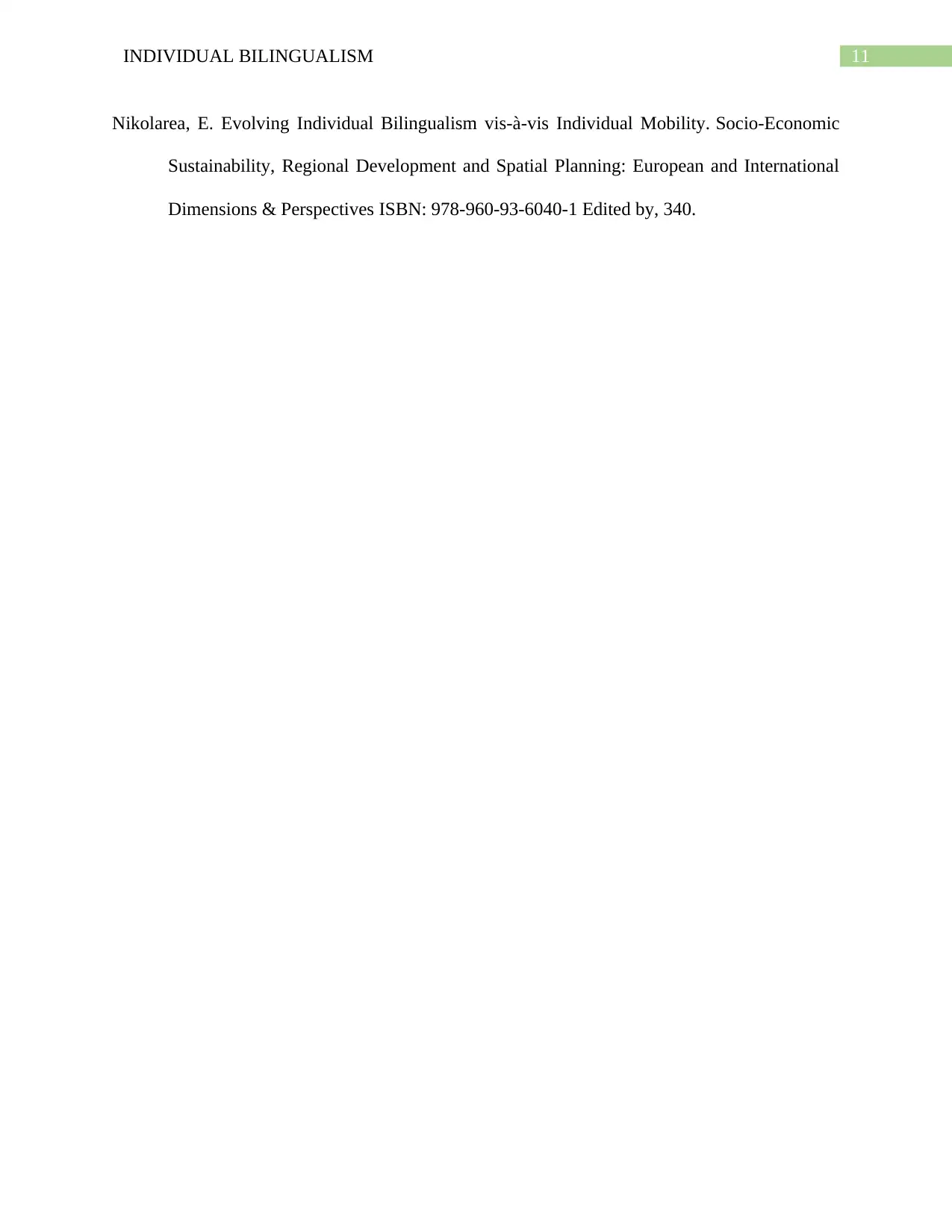
11INDIVIDUAL BILINGUALISM
Nikolarea, E. Evolving Individual Bilingualism vis-à-vis Individual Mobility. Socio-Economic
Sustainability, Regional Development and Spatial Planning: European and International
Dimensions & Perspectives ISBN: 978-960-93-6040-1 Edited by, 340.
Nikolarea, E. Evolving Individual Bilingualism vis-à-vis Individual Mobility. Socio-Economic
Sustainability, Regional Development and Spatial Planning: European and International
Dimensions & Perspectives ISBN: 978-960-93-6040-1 Edited by, 340.
1 out of 12
Your All-in-One AI-Powered Toolkit for Academic Success.
+13062052269
info@desklib.com
Available 24*7 on WhatsApp / Email
![[object Object]](/_next/static/media/star-bottom.7253800d.svg)
Unlock your academic potential
© 2024 | Zucol Services PVT LTD | All rights reserved.